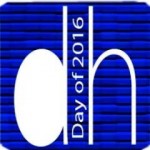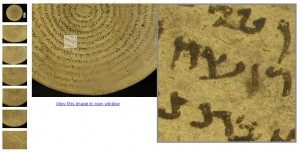Welcome to the new blog from the Digital Humanities team at the University of Exeter. Whilst Exeter has engaged in Digital Humanities since before it was called ‘Humanities Computing’, this seemed an opportune time to begin telling everyone about our activities for several reasons.

Firstly, we wanted to embrace the spirit of the worldwide Digital Humanities community, with our first post appearing on the ‘Day of DH 2016‘. ‘Day of DH’ is a collective global blog which documents DH activity around the world on a single day each year. It’s well worth dipping into blogs from previous years (2015, 2014, 2013,…) to see the breadth of expertise and depth of innovative research that the community engages in on a day-to-day basis, or you can follow events live on the twitter feed (@DayofDH).

Virtual Magic Bowl Archive – a photographic archive of Aramaic incantation bowls, illustrating early references to biblical texts and inter-faith relations in the 6th/7th centuries AD.
Secondly, this initial post is timed to coincide with an announcement of a major new investment in digital facilities for the Humanities at Exeter. New labs will provide equipment and space for digitisation of primary source materials, 3D scanning, viewing and printing, innovative space to curate digital exhibitions, and space to ‘talk DH’ with Exeter’s experts, like-minded academics and interested students. You can read more about this in our press release.

3D Scanning a plasterwork frieze at Walronds, Cullompton, preserving the current (restored) state and allowing accurate comparison with other plasterwork across the region (courtesy of Cullompton Walronds Preservation Trust).
Thirdly, it’s high time we started writing about the work we do here at Exeter. There has been DH activity here since at least 1985, and though it has waxed and waned over the years, there is a renewed interest and increasing activity in DH which makes Exeter an exciting place to be. Over the coming months we’ll be highlighting some of the projects we are working on, as well as looking in detail at the new facilities as they develop.
And last but not least, the trickiest question in DH – what is Digital Humanities? Or rather, how do we define DH at Exeter? We have always seen the digital methods we employ as complementary to the research that goes on in all Humanities departments. Sometimes these methods create new ways of looking at old questions. Sometimes they can speed up the research process, or facilitate the collection of primary evidence. Or they can allow access to materials otherwise unavailable. But DH doesn’t (in our opinion) change the essential nature of humanities research, nor is it a field of study in itself. We hope to show more of our understanding of DH on these pages in the coming months by examples of good practice and innovation, to supplement this overview.
So, we look forward to showcasing our work with you, and hopefully generating healthy discussion through comments here or on Twitter, or by other means. Meanwhile, we’re always happy to talk about digital methods and DH in general, especially where there’s potential for new innovations or new projects.
Gary Stringer
G.B.Stringer@exeter.ac.uk
@gbstringer
